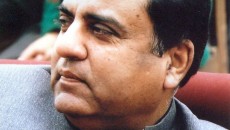War on terror and our sick and outdated system
By Shiraz Paracha
Many of those responsible for creating terrorists are condemning terrorist attacks. Condemning one and waiting for the next attack has become a norm, a habit. As terrorists’ Godfathers condemn acts of their products, the State wants us to support its war on terrorism. The public must stand by the State because without the public support, the State cannot defeat terrorists. However, public scrutiny of the war is equally important.
Ensuring 100 percent transparency is crucial for the success and credibility of this war. The public and the media have the right to know that actual terrorists and their facilitators are killed in operations. There must not be deliberate targeting of innocent people or mistakes that cost civilian lives in the war on terror.
Thirty-five years ago, the State had created jihadi warriors and had claimed that those warriors were defenders of Islam and Pakistan. Now the State is operating against the same jihadis terming them terrorists. Both the claims of the State cannot be right.
Until 15 December 1971, the State of Pakistan kept telling us that it was winning against Bengali traitors and terrorists, the next day we realized with horror that our State had lied to us all along.
The State told us it protected the Bengali people but after the war, numerous stories of rape and murder of Bengali civilians appeared in the press.
Lies and war crimes of 1971 still haunt Bangladesh and Pakistan. The lesson of 1971 war is that the State must not lie to the people of Pakistan again. In any conflict, innocent people must not be terrorized or killed. Dignity and privacy of civilians caught in a conflict should be respected and human rights violations be avoided. Law enforcing agencies often complain for the lack resources and equipment. No doubt modern technology and equipment enhance performance and capabilities of security agencies but there is no alternative to human intelligence and public trust. Peace can return if the public will trust the State and government. In such case the people will actively support the war on terror. But, in Pakistan, a huge trust gap exists between the State and people.
The public do not trust law enforcing agencies and security forces as well as politicians. This lack of trust is the major reason of our failures on the security front. The trust deficit between the State and people is due to the colonial and repressive nature of our governance system and administrative structures. The whole system is based on lies, deceit and colonial authority. Pakistan’s social and governance system is sick and outdated, and it is not delivering. This non-delivery results into public anger and frustration. Some disillusioned people turn against the state and try to impose their alternate imaginary system by force; others become indifferent and lose confidence in the State. Such environment suits opportunist and half-literate religious leaders and cunning politicians. They use public disappointment to their advantage by giving false hopes and solutions but actually, they help maintain the status quo.
Shiraz Paracha is a famous writer and journalist and currently works at Abdul Wali Khan University Mardan (AWKUM) and Government of Khyber Pakhtunkhwa. He is known for his understanding with Central Asian issues. He had been working with Kazakhstan Institute of Management and Research and Press TV. He finished his studies in International Journalism at City University London.
Disclaimer:
The views and opinions expressed in this article/Opinion/Comment are those of the author and do not necessarily reflect the official policy or position of the Dispatch News Desk. Assumptions made within the analysis are not reflective of the position of Dispatch News Desk.






